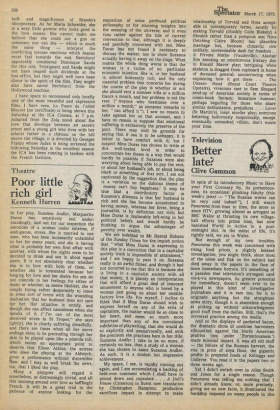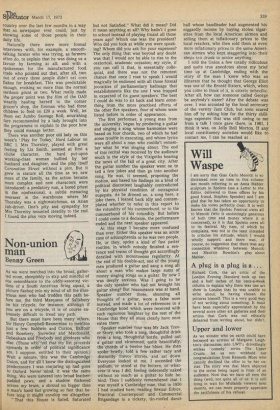Better late?
Clive Gammon
In spite of its introductory Music to Have your First Coronary By, its portentousness, its occasional plonking fatuity (this week's jewel — "The Russian winter can be very cold indeed "), I still watch Panorama from time to time, the more so since HTV, growing almost as arrogant as BBC Wales at thrusting its own village. hall efforts into prime time, has now banished World in Action to a postmidnight slot. In the midst of life, it's rightly said, we are in Wales.
But 'enough of my own troubles. Panorama this week was concerned with rising food prices, a slightly belated investigation, you might think, since most of the noise and flak on the subject had died away in the papers in the face of more immediate horrors. It's something of a paradox that television's strongest card vis-à-vis newspapers, its greater potential for immediacy, doesn't seem ever to be played in this kind of investigative journalism and it is rare too, for it to originate anything but the straightest news story, though it is shameless enough at picking up without acknowledgment good stuff from the dailies. Still, that's the universal practice among the media.
And so the displays of packeted bacon, the dramatic shots of combine harvesters silhouetted against the North American prairies (see under ' Portentousness ') made minimal impact. It was all old stuff — the failure of the Russian harvest, the rise in price of soya flour, the gigantic profits in prepared foods of Kelloggs and Unilever. You read it in the papers two or three weeks ago.
Yet I didn't switch over to Alias Smith and Jones for a single reason. Though Panorama was telling me nothing that I didn't already know, or, more precisely, giving me no new facts, it illuminated the harddhip imposed on many people in this country over the last few months in a way that no newspaper ever could, just by showing some of those people in their daily life.
Naturally there were more formal interviews with, for example, a smoothtalking farmer who was trying, as farmers often do, to explain that he was doing us a favour by farming at all; and with a Spokesman for the manufactured food trade who pointed out that, after all, two out of every three people didn't eat corn flakes for breakfast. This was predictable enough, evoking no more than the normal sardonic grunt or two. What really made the proper point was the film of the OAP wearily hauling herself to the corner grocer's shop, the fireman who had three Children to feed on £20 a week. Well, let them eat Jumbo Sausage Roll, nourishing fare recommended by a lady brought into the programme to explain to the poor how they could manage better.
There was another poor old lady on this week's 'Play for Today,' Hard Labour on BBC 1. Mrs Thornley, played with great feeling by Liz Smith, seemed at first a cliché character, the hard put-upon working-class woman bullied by her husband and daughter, and the play itself Coronation Street without a plot. But it grew in stature all the time as we saw more of the family, as the action became more complex and new characters were introduced: a predatory nun, a bored priest M the confessional, a subtle menacing overseer in the warehouse where Mr Thornley was a nightwatchman, an Asian cab-driver. One's pity and sympathy for Mrs Thornley mounted steadily to the end. I found the play very moving indeed.



































 Previous page
Previous page